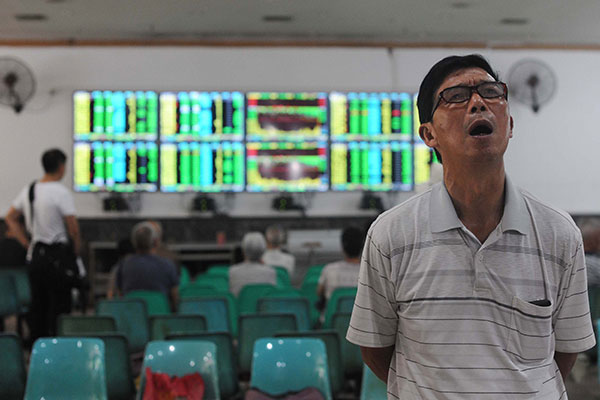Stock slide may ignite wider crisis
By LI XIANG/WU YIYAO (China Daily) Updated: 2015-07-03 08:46
|
 |
|
An investor is checking stock index at a brokerage house in Shanghai on Thursday. [Photo/China Daily] |
Spillover could harm sluggish economy
The boom and bust cycle in China's equities market seems to be taking place much quicker than anticipated, sparking warnings thatstock market turmoil may generate a systemic financial crisis that could spill over into the country's sluggish economy.
Supportive government policies once again failed to prevent the A-share market from free-falling as the benchmark Shanghai Composite Index declined 3.48 percent to close at 3,912.77 points on Thursday.
It was the first time since April that the index closed below the psychologically sensitive level of 4,000 points. About $2.65 trillion in market value has been wiped out in three weeks.
Thursday's decline came after a string of government policies to lift the market, including the securities regulator easingmargin trading rules and the stock exchanges cuttingstock trading fees by 30 percent.
The People's Bank of China also announced an injection of additional liquidity worth 35 billion yuan ($5.66 billion) through open market operations after cutting interest rates and the reserve requirement ratio for banks over the weekend.
But traders did not buy into the supportive measures as they continued to dump stocks and liquidate their leveraged margin positions.
Economists warned that investor panic may continue to spread and generate further selling pressure, which could have a detrimental impact on the country's financial stability and the overall economy.
"Whether the government can prevent a systemic financial crisis from happening will have a direct impact on China's effort for financial innovation," said Guan Qingyou, executive director of the research institute at Minsheng Securities.
"It also matters for social stability and the country's overall economic development," Guan said.
On Thursday, Zhou Xiaochuan, governor of the PBOC, the central bank, said during an internal meeting that China will firmly hold the bottom line to prevent systemic and regional financial risks.
- 2015 China International Fair for Investment and Trade kicks off in Xiamen
- China's commodity imports robust in Jan-Aug period
- China stocks rebound 2.92%
- 2015 China box office already past 2014 total
- China foreign trade decline widens in August
- Interview: JP Morgan's senior executive bullish on China
- Innovation, development the focus for NZ mayors
- Lives of freelancers

















